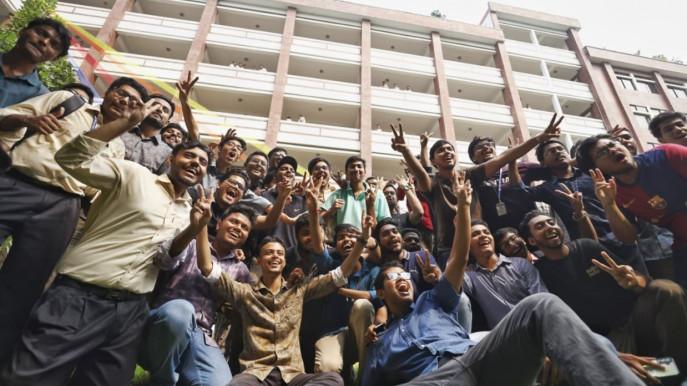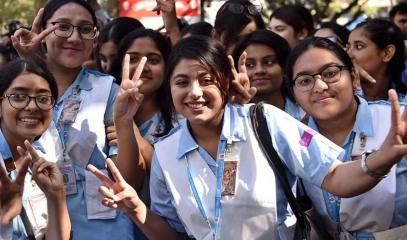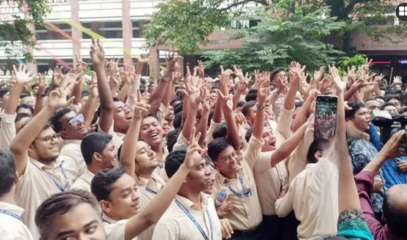Dhaka's 2025 matriculation disaster reflects failing education system
The national pass rate has fallen to 58.83%, the lowest in 21 years. Over half a million students failed, while 77,000 fewer than last year achieved the highest marks (GPA-5). Scholars and educators are questioning the reasons for the crisis. Catholic schools are spared, although they too have recorded a (minimal) decline in results.
Dhaka (AsiaNews) - The results of the 2025 HSC and equivalent examinations have highlighted a serious crisis in Bangladesh's education system. The national pass rate fell to 58.83%, the lowest in 21 years. Over half a million students failed and the number of pupils who obtained an average grade of five (GPA-5, the maximum) fell by 77,000. This is what emerges from the official results, which were published on 16 October.
In the current year, at least 202 institutions recorded a pass rate of zero, compared to 65 last year, highlighting a marked increase that confirms the drastic deterioration in the average national education system. Only 345 institutions achieved a pass rate of 100%, compared to 1,338 in 2024. Experts argue that this is the most obvious reflection of the deterioration in the quality of education and the often conflicted and critical relationship between teachers and students.
The HSC exam is a crucial milestone for students after Year 12 (upper secondary school). It determines access to university, scholarships and, last but not least, job opportunities. Success in the school-leaving exam has a strong social value, as well as a symbolic value linked to numbers, and contributes to national development.
Educator Rasheda K. Chowdhury, a former adviser to the interim government, said: “The unrest in the education sector throughout the past year has certainly affected the results”. Teachers' movements, harassment cases and instability in schools have disrupted the normal learning process. Mohammad Moninur Rashid, a professor at Dhaka University, noted that this year's results are based on fair assessment, without “sympathy marks”.
The professor went on to stress that students should receive the marks they deserve, while adding that strict assessment by teachers alone cannot explain such widespread failure. In contrast, education consultant C. R. Abrar called for self-criticism, stating that the unsatisfactory results in English and ICT (Information and Communication Technology) highlight long-term learning gaps. “We must identify the real crisis in learning,” he warned.
The Madrasa Board recorded the highest pass rate, at 75.61%, while other institutions experienced greater difficulties. The overall average for the 11 boards was 58.83%. Despite the decline at the national level, some colleges run by the Catholic Church achieved good results. Notre Dame College in Dhaka, one of the best institutions in the country, had 3,251 candidates, of whom 3,226 passed and 2,454 with an average of 5. The pass rate was 99.23%.
The college principal, Fr Hemanto Pius Rozario, CSC, said, "This time the results were good. Although in the past we had a 100% pass rate, some students failed the exam due to the post-Covid situation and the national trend.‘ In addition, eight students were absent due to illness. After the results, students and parents celebrated. Mobinur Rahman Mamun, a parent, said, ’My son Alvi Rahman achieved a GPA-5. It is a dream come true for our family."
Holy Cross College, another Catholic-run institution, had 1,307 students, of whom 1,304 passed and 960 had an average of 5. The pass rate was 99.77%. Principal Sr. Shikha Laetitia Gomes CSC said: ‘This is the worst result in 21 years. It is frightening for our future. We need to discuss why this is happening.’
The Catholic Church in Bangladesh runs 1,100 educational institutions, including 18 colleges and one university.
While some colleges had recorded 100% pass rates in previous years, this year even Catholic institutions saw a decline. Experts agree that the disastrous result cannot be attributed to a single group, but reflects the weakness of the entire education system.
They are calling for a collective effort by the government, school boards, institutions, teachers and guardians. Without a real improvement in the quality of learning and a restructuring of the education system, Bangladesh could continue to face similar crises in the years to come.
07/02/2019 17:28
11/08/2017 20:05









.png)










